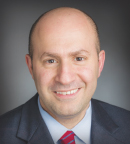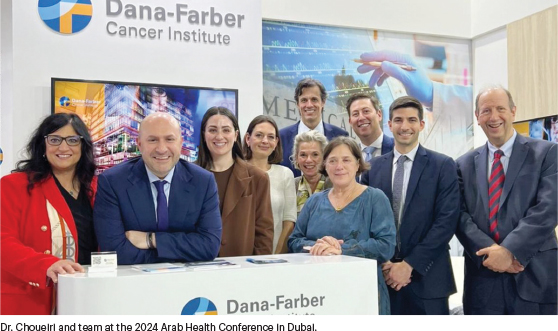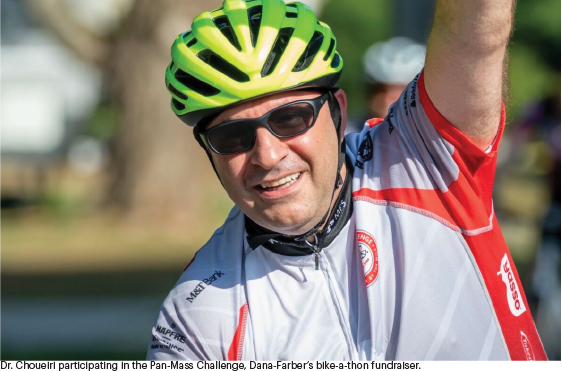Genitourinary cancer expert Toni K. Choueiri, MD, FASCO, was born in 1975 in Beirut, Lebanon, the year a devastating civil war erupted, lasted for 15 years, and cost the lives of some 150,000 individuals and also led to the exodus of almost 1 million people from Lebanon. “People with the financial wherewithal fled, but my parents were relatively poor, so we stayed, survived, and focused on education” he shared.
Dr. Choueiri continued: “I was a good student and was shaped by discipline instilled by my parents. You wake up, you go to school, you come back, you eat, and now there is extra work. When I was growing up, you didn’t have lots of leisure time, to go to the beach, for instance, because you never knew when the bombs would start dropping. You spent time in the bomb shelter with a candle and a book.”
TONI K. CHOUEIRI, MD, FASCO

TITLE
Jerome and Nancy Kohlberg Professor of Medicine, Harvard Medical School; Director of the Lank Center for Genitourinary Oncology, the Dana-Farber Cancer Institute, Boston
MEDICAL DEGREE
Saint Joseph University Faculté of Medicine, Beirut
ON THE VALUE OF SMALL IDEAS
“I only believe in small ideas; big ideas are to sell movies. Small ideas and increments get you the 0.001% improvement every day. That’s central to my philosophy of how to make positive things happen.”
Asked about his decision to become a physician, Dr. Choueiri replied: “There was nothing exciting about the decision process, in other words, no great flash of inspiration. Medicine was simply a natural progression of enhancement seeded by my parents’ wisdom—just grinding it out, a process to transport me to the next level. I believe strongly in small ideas and increments to make steady improvements; big ideas are to sell movies. Small ideas get you the 0.001% improvement every day. That’s central to my philosophy of how to make positive things happen.”
Medical School
After graduating from high school, Dr. Choueiri attended Saint Joseph University of Beirut (USJ), a private Roman Catholic research university founded in 1875 by French Jesuit missionaries. USJ stands out as a unique university in the Middle East and the Arab world by being the only one to follow the European Credit Transfer and Accumulation System.
“The Lebanese society is very international in the sense that most everyone speaks several languages,” Dr. Choueiri explained. “We talk about world affairs, global sports and social issues; it’s not a society that is isolated. So, after I attained my medical degree, I wanted to go abroad for my internal medicine residency. For every person who lives in Lebanon, there are about five who have moved outside the country. I already had two cousins in Boston, an aunt in California, one in Canada and my sister was on her way to France, and I decided on the United States because it offered me the most opportunities.”
According to Dr. Choueiri, he “landed in Cleveland,” because it was the easiest place for an immigrant to enter and assimilate. “Unlike Boston or New York City, where I’d also considered going, Cleveland was in the Rust Belt, and things were falling apart at the time compared to decades prior, but it was an amazing experience. The Cleveland Clinic is humongous; it has its own zip code. And it’s extremely diverse. We had doctors from all over the world,” he said.
Residency and Fellowship
Dr. Choueiri shared more on his career journey through residency and fellowship: “I spent 3 years in internal medicine during my residency program at the Cleveland Clinic and then remained there for a 3-year medical oncology fellowship. And, as it happened, I met my future wife during residency, who’s from Boston, which is one of the reasons for my later move to Dana-Farber. My philosophy about medicine could have been ripped from the pages of one of my favorite authors, Charles Bukowski: ‘You begin saving the world by saving one man at a time; all else is grandiose romanticism or politics.' I’m a huge believer in this.”
According to Dr. Choueiri, the Cleveland Clinic had a first-class urologic oncology program. “At that time, urologic oncology at Cleveland Clinic was very strong. We had Derek Raghavan, Head of the Cancer Center. Derek is bigger than life, and one of my first mentors; he gave me manuscript opportunities and introduced me to the international community. We also had Ron Bukowski, who was very generous, as was Derek, and I’d also mention Brian Rini and Rob Dreicer as important figures as well as from Urology Eric Klein and the late Andy Novick. So, it was a robust team to be part of,” he shared.
Although his career was blooming at the Cleveland Clinic, Dr. Choueiri’s wife wanted to return to Massachusetts to be near family, so he began looking for opportunities in Boston. “My wife moved to Cleveland when we were married, and we lived there together for 3 years. We have so many great memories of our time there, and were so fortunate to make so many friends. We have returned to Ohio several times since leaving and have taken our kids, too, so that they can experience the special culture there and visit our favorite places.
Dana-Farber and a Career in Kidney Cancer
Dr. Choueiri continued: “I interviewed at Boston Medical Center and some private practices, but I couldn’t get many other interviews in Boston. But, as luck would have it, Dana-Farber at the time was looking to ramp up its non-prostate cancer program and wanted a clinician-scientist to do kidney/bladder research. So, in 2007, I interviewed with Phil Kantoff and got the position. I signed on board without reading the salary, benefit package, or anything, but fairly quickly, I rose from doctor to Assistant Professor, Associate Professor, and full Professor.”
From 2015 and for the next several years, Dr. Choueiri led the development of cabozantinib in metastatic renal cell carcinoma from early phase I to randomized trials, leading to its approval in tyrosine kinase inhibitor–refractory disease and in untreated patients with renal cell cancer. Dr. Choueiri also led a study showing that patients with metastatic papillary renal cell carcinoma benefited from savolitinib, a drug targeted to an abnormal genetic pathway causing cancerous growth, and led the development of HIF2 inhibitor belzutifan also from phase I to phase III. The latter was based on his Dana-Farber colleague and friend Bill Kaelin’s work and resulted in Bill receiving the 2019 Nobel prize in Medicine or Physiology. In 2016, Dr. Choueiri was appointed as the Director of the Lank Center for Genitourinary Oncology, and in 2018 as the Jerome and Nancy Kohlberg Professor of Medicine at Harvard Medical School and at Dana-Farber Cancer Institute.

“I have a small lab now, also,” added Dr. Choueiri. “I’m a physician-scientist, and my current work focuses on biomarkers and clinical trial design, looking, in part, at immunogenomic mechanisms contributing to response and resistance to targeted therapy and immunotherapy.”
Evolutionary Role With ASCO
Over the course of his career, Dr. Choueiri became involved with ASCO, a relationship that continues to grow. Asked to shed light on his ASCO connection, he replied: “I really love ASCO, for one, because of the opportunities it offers its members. When I joined Dana-Farber, I didn’t have any grants or sponsorship. The work in clinic made me a better physician, but the deep science was a struggle. However, in 2010, an opportunity came through the ASCO Career Development Award [CDA]. I worked with people at the School of Public Health, and we put together a CDA proposal. I was awarded a $200,000 grant over 3 years, which helped me fund my salary and protect research time. I will always be grateful for this opportunity.”
Dr. Choueiri continued: “Boston didn’t have the highest salaries for starting physicians. So, $200,000 allowed me to cut my clinic time down to 2 days a week. And at the end of the third year of the grant, I was able to publish and applied for another bridging grant, which I got. So, ASCO has been a pivotal aspect of my research career. I strongly advise fellows to get involved with ASCO, as a vehicle to collaborate and network. It is a win-win situation, because the more you give the more you get.” Dr. Choueiri was recently elected to an Undesignated Member Seat of ASCO’s Board of Directors. He is also Chair of the virtual ASCO Plenary Series and Co-Founder of the ASCO International Medical Graduates Community of Practice.
Current Work
Asked to briefly describe his current work week, Dr. Choueiri replied: “I probably spend around equal time doing clinical work, research, raising philanthropy for cancer research and administration. Then there’s my work with ASCO and other societies. Then there’s family of course. I’m not in the danger zone of burnout because I love to work, and I am incredibly lucky to have such a supportive family and amazing team of colleagues. I always stay involved in patient care from all over the world. Even if I end up not seeing a patient, I have contact virtually, through e-mail, and all the other great digital access points we now have at our fingertips.”
Dr. Choueiri then shared some thoughts on the unique nature of cancer care and the busy mix of his days. “Oncology is all about following patients with cancer you’ve treated, which creates a special bond, unlike any other, in my opinion. In the end, my week is filled with a number of challenges, from the clinic to the lab, to board meetings at ASCO, and I truly love all of it, even when things are not going the way I planned. It is all part of the mix.”
Reflections on Building Survivor Skills
Dr. Choueiri’s early years during the Lebanese Civil War were formative in many ways. Asked to reflect on how the intersection of war and youthful ambitions helped form his world view, Dr. Choueiri responded: “Do you know what the number one determinant of one’s success is? No, it’s not hard work and not your IQ. Those are all important, but by far, your place of birth a huge slice of the success pie. I think part of growing up during war and strife builds strength and survivorship skills—and it gives you a perspective of the world outside of your bubble. I am extremely grateful for a country that gave me a second chance. I never would have done anything like this anywhere else except in the United States.”

Decompression Time
How does a busy oncology leader decompress? “When I came to this country, I fell in love with coffee and remember the only thing inside the clinic open 24/7 for food was McDonald’s. So, we would eat McDonald’s at 2:00 AM and drink coffee. I think in the morning, coffee is so important—two cups of good coffee. Also, I cycle, not a lot, but I do the Pan-Mass Challenge. I started 6 years ago. It’s the biggest fundraiser of the year for Dana-Farber, and $70+ million is raised from a 2-day bicycle ride across Massachusetts. I also enjoy playing pickleball, and spending time with family and friends. My wife Sue, son Sam, daughter Zeina, and Wheaten Terrier Fergus, love to travel together, to take long walks, to follow soccer and basketball, and are always open to the next adventure. That’s about it, nothing too complicated,” said Dr. Choueiri.

